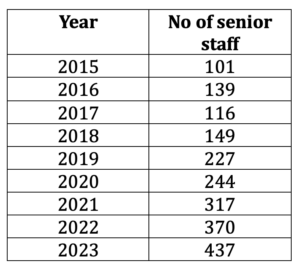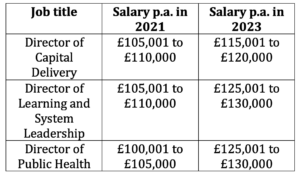The number of senior staff in the Town Hall keeps rising, with a 38 per cent increase between 2021 and 2023 alone, but the explanation remains a mystery
Recently released figures show that, between 2021 and 2023, the number of senior staff in the Town Hall increased from 317 to 437, that is by 38 per cent.
This continues a trend going back to 2015 (the earliest year that is comparable):
As a graphic illustration of the cohort that has been created, in 2023 the top team in the Town Hall consisted of the CEO, Linzi Roberts-Egan, her deputy, four ‘Strategic Directors’, 16 ‘Corporate Directors’, 16 ‘Directors’, and then an array of their deputies.
Examining this expansion in more detail, it appears that some of it occurred because of new appointments (see links for an example), and some because as existing staff moved up or between grades, a proportion every year crossed the £50,000 p.a. threshold which LBWF (like many councils) uses to differentiate between the senior and the rest.
Turning to what these changes have meant for the important matter of salary costs, the surge in numbers obviously on its own must have pushed the total upwards.
But there also seems to have been a degree of more general uplift, particularly benefiting higher earners. Comparisons over time are not easy, because LBWF regularly changes job titles, but where the latter have remained the same, the following are indicative:
The upshot, publicly available data suggests, is that while LBWF was paying out at least £26m. for senior staff salaries in 2022, a year later the equivalent sum was £30m., i.e., 15 per cent more (the caveat ‘at least’, because neither figure includes national insurance payments, pension contributions, and miscellaneous perks).
Perhaps no-one better illustrates the ongoing bonanza than Ms. Roberts-Egan.
Her current salary is £217,671 p.a., that is, more than the Prime Minister and even Sue Gray. In addition, Ms. Roberts-Egan likely benefits from substantial employer pension contributions, which appear to be unpublished, but are likely to be worth another £20,000 p.a. or so.
Many will be bewildered by the foregoing. After all, these developments have occurred during a time when LBWF has repeatedly complained of financial pressures, and in the end embarked on a large-scale voluntary redundancy programme, plus service cuts.
What’s been going on?
One hypothesis is that LBWF’s hands have been tied, because faced with greater demand for services (not least housing), and in a less favourable financial climate, adding management and specialist expertise has been simply unavoidable.
This appears plausible, but on examination turns out to be less so.
LBWF certainly has faced new and often complex challenges, but whether by enough to fully explain the mushrooming of senior staff is debatable.
After all, as already indicated, in the period 2015 to 2023, the number of senior staff in the Town Hall didn’t expand by drips and drabs, it quadrupled.
Is it likely that, in parallel, LBWF’s workload (however that might be measured) grew by a matching amount?
That surely stretches credibility.
Another hypothesis is that LBWF’s employment of extra senior staff has been all about improving working practices, and thus enhancing resident services.
This again seems plausible, but also opens the door to controversy, though this time of a different kind.
For if the new senior staff are part of a drive to produce positive change, it should be possible to pinpoint numerous tangible gains, perhaps even a qualitative transformation, but the truth is that LBWF seems little better today than it was in previous years.
Thus, LBWF is still prone to gaffs, revealed in the last few months, for example, to have spent heavily on its self-described ‘core purpose’, 15 Minute Neighbourhoods, but then dropped the whole idea overnight and without explanation; misapplied the law when answering a Freedom of Information Act request, in the process wasting ‘significant’ amounts of public money; blatantly ignored its mandatory responsibility to provide transparency data; and used a staff appraisal scheme that Ms. Roberts-Egan suddenly decided was ‘not fit for purpose’.
Moreover, in overall terms, LBWF’s performance remains distinctly below par, with the Office for Local Government currently revealing that, when rated on 24 metrics covering waste management, corporate finance, planning, and adult social care, LBWF generally performs worse than the English local authority median.
Nor has LBWF shaken off its long-term tendancy to treat less well-off residents with disdain.
To give a flavour, in March 2024, the then Secretary of State for Levelling Up, Housing and Communities, Michael Gove, wrote to Ms. Roberts-Egan expressing concern about the fact that, on three separate occasions, the Housing Ombudsman had judged LBWF to be guilty of ‘severe maladministration’ in the way it responded to residents’ complaints.
And a few months later, LBWF itself found that, after polling a sample of its own tenants, only 21 per cent of those who had made a complaint in the past year were satisfied with the way it had been handled.
So, if the year-on-year increase in senior staff really has occurred because of a desire for improvement, someone, somewhere, needs to explain why it hasn’t delivered more substantial results.
As will have become apparent, the preceding paragraphs leave many questions unanswered.
Furthermore, there are other possibly relevant factors that have not been discussed at all, such as the roles played by empire building and internal office politics.
Inexplicably, up till now, councillors seem to have largely overlooked the growth of senior staff numbers and pay, leaving successive CEOs to their own devices.
Given the many millions of pounds that are at stake, this situation needs reversing, and urgently.


